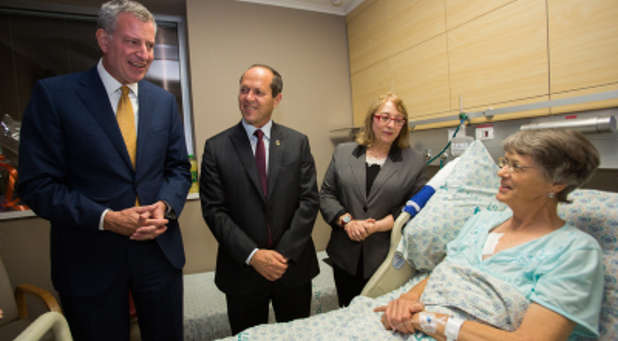The Power of Forgiveness: Horrifying Terror Attack Transforms Israeli Woman
Seated outdoors at Jerusalem’s First Station, a trendy meeting place flanked by restaurants and a running trail, Marike Veldman sipped her coffee, relaxed and eager to share her journey over the past year.
It is a miracle that Veldman, 70, was sitting there at all—alive and no longer traumatized in public spaces. One year after nearly being killed in a terror attack, Veldman’s story is one of forgiveness and hope that propelled her out of a pit of fear and despair.
“God is so profoundly good I have no words to express that,” Veldman told KNI in an interview. “Every day I am so thankful I’m alive. I’m back to normal life and I am so grateful that I’m healed.”
On Oct. 13, 2015, Veldman was severely injured in the attack on bus No. 78 in Jerusalem. She was seated across from two young men who, within minutes of her boarding the bus, jumped to their feet, yelled, “Allahu akbar“—and embarked upon a killing spree.
One was armed with a knife and the other with a gun. Three men were killed in the attack and several people were wounded. Veldman was the first victim, stabbed six times—in her shoulder, right arm, hand and even her chest.
“I called upon the name of Jesus in Dutch. I was saying his name over and over again—I feel that saved me,” she said. “The attacker left me after that.”
Veldman escaped the bus and staggered half a kilometer, feeling faint and losing blood, before a passing motorist picked her up and called an ambulance.
The attack on bus No. 78 came at the beginning of what has been called the Lone Wolf Intifada, a surge in stabbings, shootings and vehicular and rock attacks that swept through all parts of the nation.
In an interview one week after the attack, Veldman spoke in low tones, haunted by the fresh memories of terror, yet aware of her miraculous escape. Now, one year later, the Dutch Christian is bursting with vitality. Not a shadow of the dark moment clouds her demeanor. While her physical scars remain, Veldman’s emotional scars are well on their way to healing.
“I feel it’s really over,” Veldman said. “It doesn’t disturb me any more.”
A nurse by trade, Veldman came to Israel in 1977 as a volunteer at Hadassah Mount Scopus Hospital and then at a Ramallah orphanage. She later became an official foster mother in the State of Israel and spent 31 years raising Arab children from both Muslim and Christian backgrounds in Jerusalem. Veldman cared for 20 children in that time, most of whom are now adults and remain close to and call her “mom.”
After the attack, however, Veldman feared Arabs, especially men. In a poignant exchange in the hospital, one of her foster daughters asked her: “Mom do you hate us now? Do you hate Arabs?”
“It hadn’t crossed my mind to hate them. Not even the man who stabbed me,” Veldman responded.
Fear, however, paralyzed her those first few months following the attack.
“I wouldn’t leave the house alone,” she recalled. “In the beginning, my children and neighbors helped me to all my appointments, doctors, therapists, hospitals, social workers. I wouldn’t open the door if someone knocked.”
One thing she did to aid her emotional recovery was jot down a few pertinent Scriptures and carry them in her bag.
“Whenever I felt fear or panic I would stop in the streets, or wherever I was, and I would read a Scripture,” Veldman said. “This is how I calmed myself. It is God’s Word that heals. He always does what he says.”
“‘Fear not for I am with you,’ Isaiah 41:10; ‘I will not die but live,’ Psalm 118:17; ‘The Lord … will protect you from the evil one,’ 2 Thessalonians 3:3; ‘The Lord will watch over your coming and going,’ Psalm 121:8; ‘For He will command His angels to guard you in all your ways,’ Psalm 91:11.”
Veldman also experienced the healing power of forgiveness.
“God immediately told me to forgive the man who wanted to kill me,” she said. “Forgiving the person who wants to kill you is not an easy job.”
“It is a choice and I made the choice. The moment I said it out loud, peace filled my heart and I believe that is the grace of God, the peace that passes all understanding,” Veldman said. “Forgiveness is one of the aspects of healing: If you don’t forgive, it will affect the body and also the mind. I believe this is why I healed so fast.”
Veldman has shared her testimony at churches and congregations in Israel, Holland, Sweden and the United States, and with the media.
“God is using it for good,” Veldman said. “He gives me many chances to testify to his goodness and how he saved my life.”
The man who stabbed Veldman was sentenced in July to three life sentences. At his sentencing, one of the victims spoke about how she is still afraid to ride buses. Veldman wants fellow terror victims to experience what she has—freedom and healing. She is living proof it can happen.
“A year later I am back in the street, and I even rode bus 78,” Veldman said. “I would normally let the 78 pass, but I thought, ‘No, God heals and I want to take this bus.'”
And she sat in the exact seat her attacker had occupied months before, with no emotional setback.
“Every morning His mercies are new,” Veldman rejoiced. “I’m so happy I’m alive. I’m glad I’m back to normal life and I’m so grateful that I’m healed. It is His goodness.”
This post is written by a member of the Messianic community in Israel. The opinions and views expressed are solely those of the author and may not necessarily reflect those of Kehila News Israel. {eoa}
For the original article, visit kehilanews.com.














































